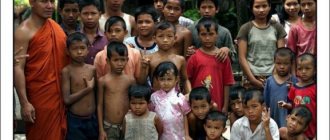Who are orphans?
The legislative acts reflect two categories of beneficiaries, which have some similarities. They concern children who cannot receive attention and care from their parents. The first group is represented by orphans, the second - children who were left without parental care. Persons whose parents have died are considered orphans. The reason for this is some kind of incident.
If we talk about children who were left without care, then this is a different category. These include citizens whose parents were unable to properly bear obligations. These responsibilities arise from parental status. Obligations are reflected in legislation.
The reason for failure to fulfill obligations is:
- deprivation of parental status;
- in accordance with the established procedure, recognition of a person as having lost legal capacity;
- the passing of a sentence by a court by which a person is deprived of his liberty;
- the person is considered dead or missing.
Most often, the listed statuses give a person the opportunity to take advantage of benefits in equal amounts.
What payments are due to orphans when studying at universities?
- orphan students and students who do not have parental care;
- disabled people of the first and second groups, disabled children;
- disabled people and veterans who participated in hostilities;
- suffered during the Chernobyl accident or from another radiation disaster;
- students from low-income families.
A presidential scholarship may also be available for studying abroad. Students who have high academic performance and take part in a scientific project have the opportunity to receive such payments. Typically, applicants are excellent students, students who have made a discovery, written an article, or patented an invention. The list of students of this category is approved by the Council of Rectors.
Cash payments
Government bodies pay a lot of attention to issues related to minor citizens. This is due to the fact that they become fully capable from the moment they reach adulthood. Decisions that have legal significance are made for them by their legal representatives. If the parents die, then the state provides payments to the child related to the loss of breadwinners in this case. In addition, payments may be of a social nature.
Benefits for the loss of a breadwinner can be assigned provided that the deceased have insurance experience. This type of payment includes two components.
These include:
- basic component;
- insurance
The size of the insurance portion depends on the amount of pension savings. If a child’s two parents died at the same time, then when calculating benefits, employees of the pension authority take into account the bases for that parent, using whose savings the payment will be greater. This rule applies in a situation where both parents worked officially.
Sometimes deceased parents do not have insurance coverage. Then the children are given pension benefits after their death. The approximate value is 12 thousand rubles. Sometimes the indicated amount increases. It depends on the region in which the minor lives. The provisions of local regulations are applied, which reflect the application of the corresponding surcharges.
ATTENTION !!! The listed benefits are used by orphans until they reach their 18th birthday. Sometimes provision is made for an extension of benefits.
This happens provided:
- the child enters full-time education;
- age category up to 23 years.
You can receive preferences up to 23 years of age.
Relaxation during studies
When an orphaned child begins to study, he is entitled to additional assistance from government agencies. The main condition is to be under the age of 23 years. In this case, the student is entitled to preferences in the form of clothing and shoes, as well as the necessary equipment for studying. In addition, the orphan receives equipment. The minimum list is reflected in acts issued by the Government.
If the beneficiary does not want to use assistance in kind, he can write an application and replace it with cash payments. They will pay an amount equal to the value of the things owed to the citizen. Payment of compensation occurs in cashless form. The funds are transferred to an account opened in the name of the beneficiary.
Getting education for free
The legislator provides for the child’s opportunity to receive an education. This happens on a par with those who also belong to preferential categories of citizens. A person receives education in a specialized educational institution. To use the exemptions, you will need to meet certain requirements. Including, the person must be included in the preferential category. In addition, the faculty he has chosen must provide budget places.
IMPORTANT !!! It will be possible to receive education free of charge if this happens for the first time. In addition, the child will need to pass tests when entering a university. Often educational institutions develop conditions under which an orphan can begin studying for free. These conditions include the fact that the citizen has a general education, which is documented.
Before entering a university, you need to pass exams at school and pass tests at an educational institution. Sometimes the rules are simplified, provided that the person has passed the Unified State Exam with high scores. When taking the entrance exams, the orphan will need to score enough points to be considered sufficient. The number exceeds the minimum value. These benefits are used by orphans after they reach adulthood. However, laws limit the maximum age of use. It is equal to 23 years.
The state has a separate policy area, in accordance with which places are allocated to children recognized as orphans. There are several options for obtaining educational services. This applies to higher and secondary education. A citizen can be enrolled in the faculty, provided that he has the same number of points as other applicants.
Sometimes admission occurs out of competition. To do this you need to be successful in sports or science. You can enter into an agreement on a quota. To do this, after completing the training, you need to work for several years at the enterprise that paid for your studies. This time is from 3 to 5 years.
Payments to orphans in universities
PPOS is designed to ensure control at the university over compliance and execution of legislative, regulatory and legal documents at any level relating to students.
— participation in the development of local regulations regulating relations in the field of study, everyday life, recreation, health care, and other issues relating to the socio-economic status of students; — participation in the resolution of disagreements and collective disputes (conflicts) between students and the university administration on issues of the socio-economic status of students. Students during full-time study at the expense of the federal budget in educational institutions of higher professional education have the right to full state support and additional guarantees for social support until the end of their studies in these educational institutions (Federal Law “On additional guarantees for social support for orphans and children left without parental care" dated December 21, 1996.
Scholarships
When completing training, citizens who are orphans have the opportunity to receive scholarship payments. Increased size. This amount does not affect survivor benefits in any way. Payment of scholarships is carried out during the entire time the citizen is studying full-time. He can undergo training at a secondary or higher educational institution.
The amount of payments exceeds those entitled to ordinary students who do not have benefits. The supplement is up to half the amount of the regular scholarship. In addition, the group of people in question has the opportunity to use additional benefits. They are expressed in the rights to receive payment in the amount of one hundred percent when completing an internship. This applies only to production practice. Every year, orphans receive a payment equal to three scholarships. It is intended for the purchase of office supplies.
Payments to orphans at the university
The application to the USZN can be sent by mail, but it will be important to attach all the documents: • Certificate of the period the ward was under guardianship • Decision to establish guardianship over the child • Certificate of secondary general education (copy certified by the educational institution) • Certificate of enrollment in college, technical school, or university (for applicants) • A copy of the work book of the graduate-ward (for employment) • The applicant’s passport • An application to the administration (department) of social protection of the population at the place of residence for the payment of benefits (compensation payment) • The applicant’s details for transferring money funds (benefits) The payment is transferred to the child’s current account or by postal order.
The scholarship commission includes the head of the educational institution, representatives of financial departments, deans of faculties (heads of departments), representatives of trade unions and self-governing organizations of students, students, and cadets of a higher educational institution.
Housing benefits
If an orphan is maintained in an orphanage, then upon turning 18 years old, the state must provide him with living quarters. While the beneficiary is undergoing training, government agencies are directing their efforts to resolve issues related to the provision of housing. In particular, accommodation in dormitories is guaranteed. A citizen has the right to use such housing, provided that it is located at an educational institution and he has not reached 23 years of age.
Orphans are also provided with meals at the educational institution. State bodies pay for it. If local authorities do not have the opportunity to allocate a place in a dormitory for a child, then they are provided with funds to rent other housing.
Orphans are entitled to a one-time social payment
The law also stipulates some nuances - school graduates who are not employed for a good reason: • due to conscription into the army for military service, • if the graduate is busy caring for a child, • if a job cannot be found and the school graduate registers with the employment service as an unemployed person, • if the graduate is undergoing training as directed by the employment service, • if the graduate is recognized as disabled or disabled since childhood.
What exactly needs to be done , what steps to take to receive the payment under discussion: Receive a certificate from the guardianship and trusteeship authorities about the period the child was under guardianship. Prepare a copy of the decision to transfer the ward under guardianship. Make a copy of the certificate of general secondary education and have it certified by the educational institution where the original certificate is located. Take a certificate of enrollment in a college, technical school or university (for wards - applicants). Make a copy of the work record book of the graduate-mentee and have it certified by the employer (upon employment). Prepare the passport of the applicant (ward). Appear during office hours and days at the territorial Department of Social Protection of the Population (at your place of residence) and submit an application for the appointment and payment of benefits (attaching the collected documents). Provide information about the details for transferring funds (benefits) to the Department of Social Protection of the Population.
We recommend reading: How to get rid of your drunk neighbor
For transport
Orphans are protected by the state to the maximum extent possible. Therefore, in addition to the listed benefits, they are also entitled to preferences related to movement on public transport. This applies to those types of funds that operate within the municipality. If an orphan decides to use the services of private cab drivers or taxis, then he must understand that in this situation the payment falls entirely on his shoulders.
If the child has medical conditions, then he is issued a permit. It gives you the right to go for spa treatment. In this situation, all costs are borne by government agencies.
Benefits and payments to orphans in 2019
This document describes in general the activities that the state carries out in relation to this category of small citizens. It is the basis for the publication of federal and regional documents regulating the activities of organizations of various forms of ownership in relation to orphans.
- In Ufa, for several years now, this category of citizens has been provided with apartments from a special housing stock. That is, part of the apartments being built in the city is purchased by the local government. They are given to orphans under a social rental agreement.
- In Novosibirsk, this category of young citizens is given a repair allowance. Its size in 2021 is 60 thousand rubles.
- In the Republic of Crimea, an orphan was given an apartment in a destroyed house. This building has walls and a roof, but no interior decoration, window or door frames. Naturally, it is impossible to live in such conditions.
The work of local governments to implement the rights of orphans is carefully monitored by the prosecutor's office. Specific employees supervising this area of work have to be held accountable for identified violations.









